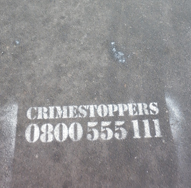As most of us play our part by following the rules and helping others, rogue traders, bogus officials and fake charity collectors are preying on the vulnerable and cynically exploiting people’s fears, says Crimestoppers, the charity that runs the freephone 0800 555 111 reporting line.
Mark Hallas, Crimestoppers CEO says: “During the pandemic lockdown, doorstep scammers are taking advantage – offering to buy shopping or collect medicine and then pocketing the cash, or selling fake Coronavirus testing kits, masks or sanitisers. Some are even charging extortionate rates to `kill’ the virus by spraying driveways and cars.
“We all need to look out for each other, especially vulnerable neighbours, friends and family. And if you have the name of someone involved in doorstep scams or a description of their appearance but don’t want to give your details, you can help protect others from harm by telling our charity what you know.
“Like millions of others who have trusted us before, you will also stay completely anonymous. We, like you, believe in safe communities. Your information can make all the difference.”
Some doorstep scams to watch out for, the charity says, include:
– A stranger offering help with shopping or collecting medication: Fraudsters often claim to help shop for those who are housebound, but then pocket the money.
– Coronavirus testing kit: people claiming to be from the NHS promoting a door-to-door initiative to test individuals for Coronavirus. The NHS is not conducting random door-to-door testing for the virus.
– Gangs offering to `disinfect’ driveways, garages or cars – then charging massively over the odds.
– Selling fake or over-priced items to protect yourself, such as fake sanitizers or face masks.
– Fake charity collectors who take a donation and then pocket the cash.
– Intimidation used: banging on a door repeatedly, claiming to be Trading Standards, threatening arrest. Don’t be sprung into submission or agreeing to something because of a cold caller’s aggressive behaviour – if you suspect somethings not right, don’t engage.
The charity stresses that reports are anonymous; if you report through the online form, your computer and mobile phone IP addresses cannot be tracked or saved.










